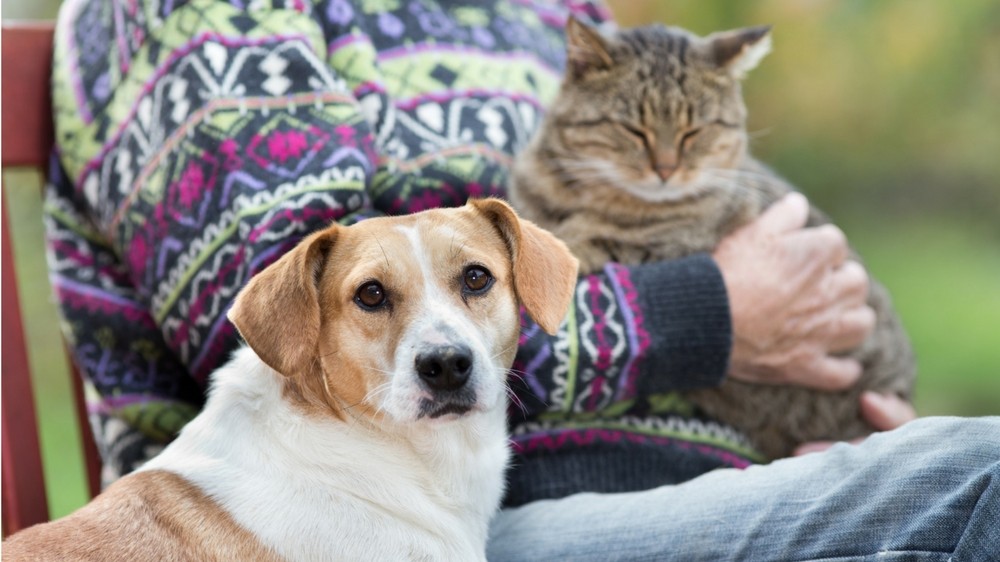Senior Pet Care 101

Getting old is inevitable for all of us, including our pets. But it’s not a disease—just the final phase in life when dogs and cats generally need a little extra TLC. Our furry friends never fail to show us unconditional love, so now it’s our turn to return the favor by recognizing the signs of aging and providing them with the best possible care—with compassion and respect. Here’s a quick primer on Senior Pet Care 101.
How Old is Old, Exactly?
The answer to when a dog or cat is considered “old” is largely determined by the quality of preventive care they’ve received throughout their lifetime as well as their overall lifestyle, but these are some good guidelines.
- Small dogs (Chihuahuas/Pugs): 12-14 years
- Large dogs (Labradors/Golden Retrievers): 9-11 (which is about 75 for people)
- Giant dog breeds (Great Pyrenees/Great Danes): 6-7 years
- Cats: 11 years is considered senior for felines, and geriatric at 19
Senior Pet Care: Changes to Watch For
They Don’t Wolf Down the Kibble Like They Used To
Just like their human counterparts, senior pets tend to eat a little less as they age than they did when they were younger. However, if you see a marked difference in their eating habits—becoming picky or eating considerably less—it could be due to a number of reasons: dental disease may be making it hard for them to chew, or failing kidneys may cause nausea when they eat. Giving up their traditional “dinnertime dance” and bad breath can be symptoms of more than just finicky eating habits, so when it comes to senior pet care, it’s important to take notice of these telltale changes.
To Play or Not to Play? Probably Not
As a young pup, your dog begged you to play fetch every five minutes, remember? Or he stood at the doorway, leash in mouth, ready to charge out for a walk. Now you have to beg him to play! Your cat could chase the laser pointer for hours—but now she never wants to, and prefers just to lie on the couch. Some of these changes in behavior may be a natural part of the aging process, but some decreases in activity may be caused by something else, like arthritis. Take note of how your pet gets up from lying down or how they maneuver the steps. If it seems painful for them, ask your vet what you can do to help them move better and/or be more comfortable.
Eh? What’s That You Say?
If your senior pet no longer responds when you call their name, they’re not being rude or sassy—promise. They may just may have become a little hard of hearing and you need to adjust your methods of communicating with them. Because sounds travel at different frequencies, your dog may not be able to pick up on your voice as easily. Try clapping your hands instead or teach them simple hand signals for various situations. Yes—cats can learn too! Keeping those lines of communication open is a tender and important part of senior pet care and helps your four-legged loved one still feel connected to their world.
Senior Moments
Yes, both cats and dogs can fall victim to forms of senility, called cognitive dysfunction. They may have a hard time with remembering familiar routines they’ve known all their lives, they may forget or disregard housetraining behaviors, or even fail to recognize family members. Other symptoms can include staring, confusion, wandering, obsessive licking, and more. This phase is an especially difficult one for senior pet care, since it can be frustrating for you and your pet too. Scolding or punishing this “bad” behavior only confuses your pet and won’t make things better. This is the time to be your most understanding and your most forgiving—you would want the same respect from your loved ones if it were happening to you.
The Tip of the Tail
As pet owners, it’s our responsibility to love them unconditionally and take the best care of them at all stages of life. Senior pet care requires a lot from us sometimes, but it’s the right and loving thing to do. If you sense your dog is having age-related issues you cannot remedy at home, schedule an appointment with your vet right away.
Get a Dog or Cat DNA Test >

Comments (0)